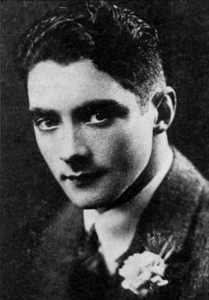
Richard Gordon Parry – commonly referred to as Gordon Parry – was known as a handsome, well-dresed lad. According to John Parkes, he would always be wearing a suit, and was a bit of a ladies’ man.
The family resided at 7 Woburn Hill, Stoneycroft, Liverpool: the residence Gordon would still be living at when Julia was murdered.
Gordon’s father Wiliam Parry was a well-respected figure in Liverpool, acting as a treasury official with Liverpool Corporation. He was also a strong methodist like his own father, and even preached the word of the good book from time to time.
As a child Gordon attended Lister Drive School. Apparently it was from this very early age while still at school that his reckless behaviour was first noticed – a behavioral trait that would repeatedly rear its ugly head again and again throughout his life:
“Each day on his way to and from school, he pulled down a boundary wall at the front of houses in the course of erection. It was done so regularly that the builders decided to keep watch, and Parry was caught in the act. I think the damage was considerable … I do know that, thereafter, he was a great source of sorrow and anxiety to his parents because of his evil tendencies.”
– Henry Harris, Court Clerk
Parry eventually left school in 1923 at the age of 14. It was then in 1926 that he would take up a position as apprentice insurance salesman with the Prudential – his supervisor Joseph Crewe was also supervisor to William Herbert Wallace. It was from this point that Parry became acquainted with the Wallaces, as he was required to call upon Wallace at his home on behalf of Mr. Crewe. In Wallace’s statement he says that Parry had called at his house once on business and left a letter for him which he had written in the front room (the parlour).
During Wallace’s brief battle with bronchitis at the end of 1928, Parry would complete the rounds for him. According to Wallace, a man named Joseph Caleb Marsden (who was out of work at the time and recommended to him by Parry) also did part of this work for him. In Wallace’s statement he claims that he came to hear Marsden had previously been fired from the Pru owing to financial irregularities… Parry would also run into the same issue, as Wallace found discrepancies in the amounts he received compared to the amounts Parry had collected, which Parry would play off as a simple mistake.
Although there is nothing to suggest Wallace ever reported Parry to the Pru (it was another man named Joseph Bamber who had warned the Pru to keep an eye on Parry before this even occurred), the higher-ups in the company eventually found out, and though he wasn’t officially fired, I get the impression they “suggested” he leave of his own volition – which he did – getting a job with the Standard Life Assurance Company some time after.
His leaving the Pru occurred about 12 to 15 months before the murder, meaning some time between October 1929 and January 1930. Considering the “irregularities” Wallace had found in the amounts Parry was handing to him would have been discovered in January of 1929, it is very unlikely that Wallace was responsible in any way for Parry leaving/unofficially being fired from the Pru.
According to John Parkes, Parry had also attempted to steal money from a cupboard at Atkinson’s Garage where one of the sons of the boss kept money. Because of this, along with his tendencies to use the garage’s phone to place crank calls and and fail to pay for work that was done on his car, workers at the garage were not too keen on his regular visits.
It is curious that a man of such character appears to have been on friendly terms with a man who by all accounts is entirely different (as well as much older) than Parry: William Herbert Wallace.
Although after Julia’s death Wallace seemed to strongly believe Parry had murdered his wife, when giving his statement he had referred to Parry as a friend of both his wife and himself – a man Julia would admit into the home without question. Years later when Parry was interviewed by Johnathan Goodman, he said that he would call on Julia from time to time (who he deemed a “sweet old lady”) for musical evenings – Julia on the piano and Parry singing. And of Wallace, friends of Parry attested that he had “quite liked” Wallace, and that he had said what a shame it was that Wallace had been arrested for the crime.
Despite his apparent friendship with Wallace, and the fact he likely did not know Wallace had fingered him as a suspect at the time (his name seems to have first came out publicly at the trial), Parry did not attend any of the hearings or trials relating to the murder.
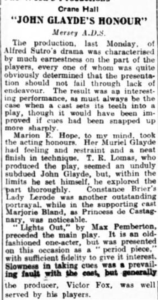
A review of a production of John Glayde’s Honour by the Mersey A.D.S., which Gordon Parry took part in. Click the photo to enlarge.
On the “Jekyll” side of the coin he was a member of the Mersey Amateur Dramatic society (referred to as the Mersey A.D.S. or M.A.D.S. at the time). He had recently appeared in a production of John Glayde’s Honour with this group, which received good reviews in the local paper.
It is actually through his passion for acting and music that he met his longtime girlfriend Lily Lloyd, as the pair were both in Lister Drive School’s drama club. The pair eventually split two years after the murder, and Lily allegedly offered Hector Munro to sign an affadavit attesting she had falsified the time Parry had arrived at her house on the night of the murder (when interviewed by Wilkes in the ’80s, Munro said he did not remember this – though Lily herself would tell Wilkes she had indeed given an earlier arrival time to police).
However, it would seem they continued to keep in contact throughout their lives, as she was already aware of his death when Wilkes interviewed her personally over the phone. She maintained that she did not believe that Gordon was the killer and that he had never told her anything that would suggest he was.
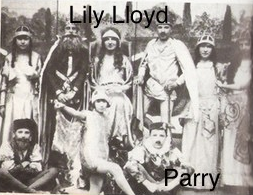
A photo of a young Gordon and Lily Lloyd with the Lister Drive drama club.
It is hard to imagine a violent murderer meeting up every week to rehearse plays, and it’s true that a friend would tell John Wilkes that Parry would run from any sign of trouble, and “couldn’t stand the sight of blood”… But in contrast to this he was accused of violence in the form of sexually assault against a young woman he met at a bar named Lily Fitzsimons, five years after Julia was murdered.
Ironically, the same Professor McFall who had been called by the prosecution in the trial of William Herbert Wallace would play defendent for Parry in this case, claiming that there was no sign that any such assault had taken place. However, the prosecution argued that an earring which had been torn from her ear, torn clothing, and witnesses seeing red marks upon her face at the time the alleged assault took place, bore out her story. All newspaper clippings I can find on this matter are in order as follows…
—
Click the images to view them in full size.
—
If this event really is true, it would show that Parry was more than a simple conman and petty thief, but a man who could also be dangerous and violent.
—
As part of his alibi for the night of the murder, Parry claimed that he stopped by Leslie Williamson’s home to discuss a 21st birthday party with Mrs. Williamson:
“..I went there and got my accumulator and then went down West Derby Road and along to Mrs Williamson, of 49 Lisburn Lane, and saw her. We had a chat about a 21st birthday party for about 10 minutes.”
Leslie Williamson himself called into Roger Wilkes’ radio show in the 1980s and made no mention of this visit (though of course it is possible he was not at home at the time), but did make clear his disdain for Parry and his character:
“While I was away at sea, he conned my mother into handing over my insurance cards for some reason or other. Because of his vicious character – and I knew he had a dual personality and he could fight – I took another chappy along with me to his home off Green Lane in case there was any fisty-cuffs, so I could get my insurance cards back – which I did do.
All I knew of Lily lloyd was that she was such a wonderful pianist. And Parry at that particular time, if I remember rightly, he’d conned her mother into an insurance policy, and he’d also conned her into handing over her engagement ring.
On the week of the murder, I was at home, on leave from sea. Parry called at our house about four or five o’clock or something like that, one evening, and I answered the door. He wanted to see my mother – my mother was a music teacher, and she had a pupil in at the time, and it was a sacrilege to break into the lesson… He was most adamant… He got in through the vestibule in Lisburn Lane, and he wanted to see my mother about a song: he wanted some music. Well this is funny… Anyway, he did see my mother; my mother came out after I’d asked her, and I can always remember them going to the music stool and asking the student to get up off the music stool, and he chose a song out of this particular stool…”
Again implying a kind of “Jekyll and Hyde” persona, Leslie Williamson outright states that Parry had a dual personality.
There are other newspaper reports of various crimes he was involved in which I will include in the later timeline, but these do not involve violence against another person… But it is indeed obvious that Parry liked to ride on the wrong side of the law.
At some point after 1932, it would seem he left the insurance business entirely. In 1934 he is listed as being a soldier, in the earlier half of 1936 a radio dealer, and by the end of July 1936 a shop manager.
Gordon Parry would marry twice, and it was with his second wife that he would have a daughter. Following this remarriage, he began work (ironically) as a GPO telephone operator in London, before moving to Wales in 1968.
Philip Roberts, a drinking buddy of his in Wales, said that Gordon had gone by the name “Dick” and that they drank at the same pub known as The Marine in Old Colwyn:“I knew this chap, knew him quite well as a matter of fact. I called him Dick. He died last spring. We both drank in the same pub, The Marine in Old Colwyn.
Dick was one hell of a character. Used to get a lot of people’s backs up. Had an incredibly arrogant manner on the telephone. Bit of a handicap really because that was his job: switchboard operator at the hospital in Colwyn Bay [Parry had worked this position in various hospitals in the North Clwyd area].”
– Philip Roberts
His final address at the time of his death (by way of heart attack at home in April 1980, aged 71) seems to have been a rather isolated home on Waterloo Hill, Abergele, Wales. It was here that he lived alone following the death of his second wife in 1976. It was not until two days after his death that his body was finally discovered.
Although Wallace’s police statement said that he did not believe Gordon drank, notes by Parry’s daughter on the death certificate claim that he was both a heavy drinker and smoker.
—
Work in progress…
12/01/1909: Richard Gordon Parry is born to William John Parry and Lilian Jane Parry (née Evans).
Residence: 7 Woburn Hill, Stoneycroft, Liverpool.
Late December – Early January 1929: Parry fills in for Wallace who is ill with bronchitis. Wallace finds discrepancies in the amounts paid in and the amounts collected during the period Parry filled in for him. Parry claims it was an oversight and puts the matter right.
October 1929 – January 1930: Parry leaves the Pru, allegedly to improve his position.
November 1930: While rehearsing with his drama club at Cottle’s City Cafe, Parry sees Wallace there for his chess club “about three” times through November, and did not know prior to this that Wallace was a member of the chess club there. Wallace recalls seeing Parry once on what he believes was a Thursday. This is probably accurate since Gordon’s drama club only met there on Tuesdays and Thursdays, while Wallace’s chess club met on Mondays and Thursdays.
The first Thursday of this month would have been the 6th of November. To have attended on a Thursday, Wallace must have been there for fun rather than to play a tournament match since his tournament days were Monday – much like how Caird was at the club on Monday the 19th despite his tournament nights being Thursday.
Depending on which Thursday in November Gordon had seen Wallace – assuming he is telling the truth that it is only then that he discovered Wallace was a member of the chess club there – the earliest the first sighting could have been would be the 6th, meaning he had between 6 and 7 opportunities to attempt to pull off the hoax call (5 or 6 IF he checked the chart early and figured that the Xs would be dates when the person would not show).
If he did place the call, then it was on the penultimate opportunity (the final date marked on the chart being the 21st February) he did so. It is worth noting that while the club usually meets every two weeks, there is over a month gap between the 19th of January when the call was placed and what was presumably the finale.
By January the 19th the night “Qualtrough” rang the club, Wallace had only showed up once since the beginning of November (on the 10th).
December 1930: Parry claims to have seen Wallace on a bus from Victoria Street during this month. Wallace claims that during this month he saw Parry in Missouri Road (where Lily Lloyd lived) driving his motor car, and it was then that Parry had given him a calendar from his new company as a gift. Since Missouri Road is in Clubmoor, the district in which Wallace collected, it is possible he was out on business at the time.
The content of any conversation that took place between the men on these two occasions is unknown.
25/01/1932: Theft of a motor car from School Lane.
27/01/1932: Parry is caught attempting to steal a car. Reported on the 30th as follows:
10/02/1932: Theft from a telephone kiosk at 14 Castle Street.
24/02/1932: Theft from a telephone kiosk at the Empire Theatre, Lime Street.
01/03/1932: Parry stands trial at Liverpool Police Court for hijacking of motor cars, and theft from café telephone kiosks. Detective Tilley stated that Parry – despite being in regular employment – was experiencing severe financial difficulties. His father said that he does not understand the behaviour, since Parry had a good home, but seems to have got into debt.
1933: Parry splits up with long-time girlfriend and childhood sweetheart Lily Lloyd.
1934: Parry, a soldier at this time, is caught attempted to steal a car with two friends, Thomas Henry Woods and Arthur Benjamin Spencer.
July 1935: Parry caught and bound over for fraudulently embezzling an amount of £2, 7s (shillings), 3d (pence). Equivalent in today’s money to around £120.
23/04/1936: An alleged sexual assault by Parry (now working as a radio dealer) takes place against Lily Fitzsimons, a woman Parry had met at a bar and offered to give a ride home to. It goes to trial but he is found Not Guilty. According to John Gannon, the girl claimed that Parry had threatened to murder her.
All news clippings for this incident can be found earlier on this page by clicking here.
24/07/1936: Parry is seen by police arguing with a woman in the streets. When he fails to provide them with his address, he is arrested and causes damage to a seat in the cell he is placed in. Due to his violence he was placed in irons, and later fined £1.
07/03/1937: Parry marries Miriam Traverse. They have a child together: Barbara Parry.
Early 1940s: Ada Pritchard (now Ada Cook) was followed by Parry – who was still married at the time – into a fish shop where he attempted to chat her up. Apparently he did not recognize her. She responded: “Gordon Parry, I’m Ada Pritchard and I know everything about you, so leave me alone”, she then left the shop and waved down the first bus that came along. He did not follow her.
13/03/1966: Johnathan Goodman, researcher of the Wallace case, confronts Parry at his home at 39 Grove Hill Road, Brixton, London. He gave a very long and detailed account of the encounter:
“Parry, who now works for ‘the government’ (telephone operator) and was about to go on night duty, is married to a plump woman who appears some years younger than himself (he is fifty-seven), and has a daughter who is just about to go to university.
We found him a bland, plausible man who was not made in any way uncomfortable by our questioning. He had grey hair, smoothed sleekly back, and a neat-clipped military style moustache. He is of medium height and is neither fat nor thin. He appears to be in very robust health, wiry and well-preserved for his age. He is of reasonably powerful build, has noticeably large hands, and a loose, damp and rather fleshy handshake. His eyes, which are of that bold blue which is traditionally associated with ‘sex maniacs’, are penetrating and alternately shifty and too-candid. He exhibits a certain lack of affect. He engenders an air of spurious authority of the kind that one encounters in the knowing, self-possessed and self-satisfied kind of a jailbird. It was an air of authority that made us think of the type of ex-army non-commissioned officer who becomes a commissionaire.
He also exudes a false trowel-layed-on [sic] charm, which can easily beguile, but is as bogus as the bonhomie of a car salesman. This manner masks, in our opinion, considerable firmness – even ruthlessness. He would be a nasty man to cross. Despite an obvious, and quite attractive sense of humour, one suspects that just below the surface there lurks a considerable capacity for unpleasantness. We would sum him up as a tricky, position-shifting individual of the con man type. He is evasive, manipulative, sharp, on-the-ball and very clever. He is quite well-spoken, and throughout the interview kept a self-satisfied and inappropriate smile on his face.
Parry hinted that, if he chose, he could reveal much about Wallace, whom he described as a ‘very strange man’; he implied that Wallace was sexually odd.
He described Julia Wallace as a ‘very sweet, charming woman’. He said that he used to sing as a young man, and would often go to tea at 29 Wolverton Street, where Julia would accompany his singing on the piano. He was quite ready to admit that, as a young man, he was what he called a ‘tearaway’. But he made little of the criminal charges against him: just youthful high spirits, no real harm done. ‘It was very awkward for me, having my little misdemeanours dragged up at the time of the case,’ he remarked.
The police, he said, were satisfied as to his innocence of the Wallace murder when he produced some people with whom he had spent the evening ‘arranging a birthday celebration’. (This new professed alibi may be significant in view of the fact that R.M. Qualtrough spoke of being busy with his girl’s twenty-first birthday party). He did not remember being in Breck Road on the night of the murder (the ‘new alibi’ mentioned by his father when JG spoke to him).
He refused to talk about his part in the case – ‘Not if you were to offer me £2000’ – because, he said, he had promised his father that he would not speak about it. He added that, when his father died, he might be prepared to talk, subject to proper financial arrangements being made. He suggested that JG had acted less than honestly in his endeavours to trace him, and had upset his father and endangered his heart. But even this was done in an oblique sort of way by saying that ‘someone’ had called on his father and upset him.
He claimed that the Wallace case broke up his engagement to Lily Lloyd. He refused to talk about Miss Lloyd, apart from saying that he was still in touch with her and that she is now living in Llandudno [Goodman claims this is a lie but later testimony from Lily shows they did indeed keep in touch].
He said that Joseph Crewe, the Prudential superintendent – now conveniently dead – was utterly convinced of Wallace’s guilt [Goodman claims this is untrue, the trial seems to suggest so]. It was surprising to learn that he knew of the deaths of Crewe, Alan Close, and Wallace’s nephew Edwin. (The latter’s death in North Borneo was not at all widely reported, which suggests that Parry watched everything that appears in connection with the case.)
A week or so after the interview, I telephoned Parry. He was viciously angry at my doing so, and I was taken aback by the breadth of his vocabulary of foul language: many of the obscenities were new to me. The odd thing, though, was that I all the time had the feeling that he was enjoying his outburst.”
– Johnathan Goodman
1974: Parry is convicted for drink driving, at this time he is residing in Wales.
14/04/1980: Parry dies of a heart attack, it takes two days for his body to be discovered.
1980 – 1984: Roger Wilkes investigates the Wallace case, with Johnathan Goodman assisting. Events of note:
- Wilkes contacts Parry’s daughter for information. She has never heard of the Wallace case or heard anything of her father’s involvement. After this call, Wilkes sends her a letter. Parry’s daughter’s husband responds, stating that the letter had greatly upset his wife. He described Gordon Parry as “secretive” a “bit of a recluse”, and the “black sheep of the family”.
- Wilkes attempts to make contact with Parry’s living siblings but they do not wish to talk to him.
- Wilkes contacts Lily Lloyd by telephone, saying this (compiled from notes Wilkes took during the call):
In January 1931 I was going out with Gordon Parry but we were not engaged. I gave a statement to the police investigating the Wallace murder, but it was only partly true. This is because I only saw Gordon later in the evening of the murder, I can’t remember how much later.
I have made that part of my life a closed book. To reopen it now would cause me great distress.
I was very, very much in love with Gordon and he with me. He was a very charming, talented, and handsome young man, and I was terribly upset when the relationship ended… I knew that Gordon had died last April, and that his wife had died some years ago.
To remember all this fifty years on brings me great pain. But I will say this: I can’t possibly believe that Gordon did this murder, and he certainly never confided in me anything that suggested he might have done. The episode is closed and it belongs to me alone.”– Lily Lloyd

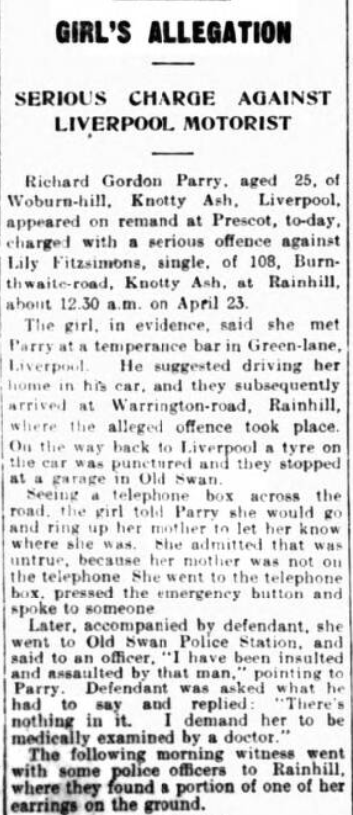
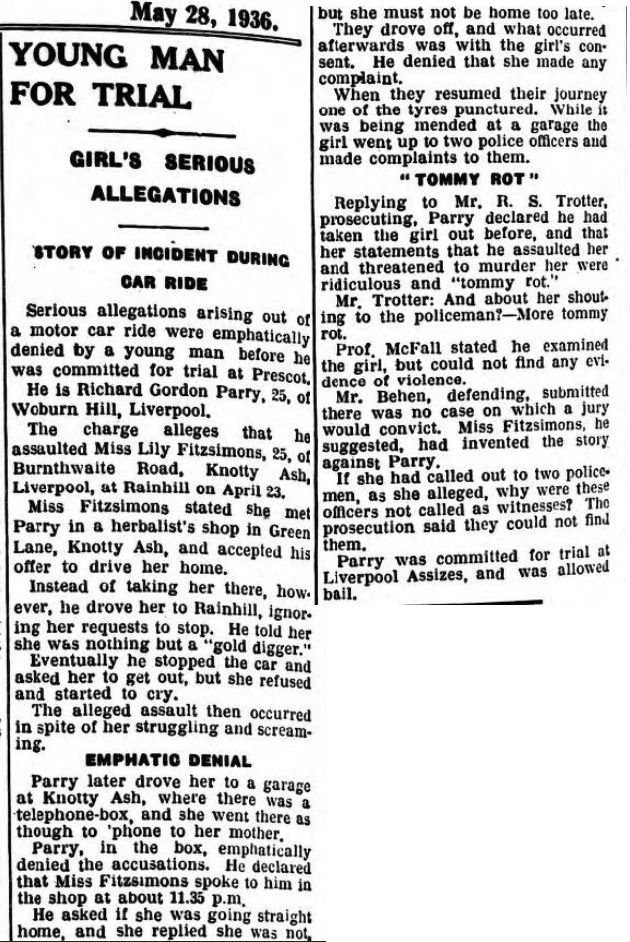
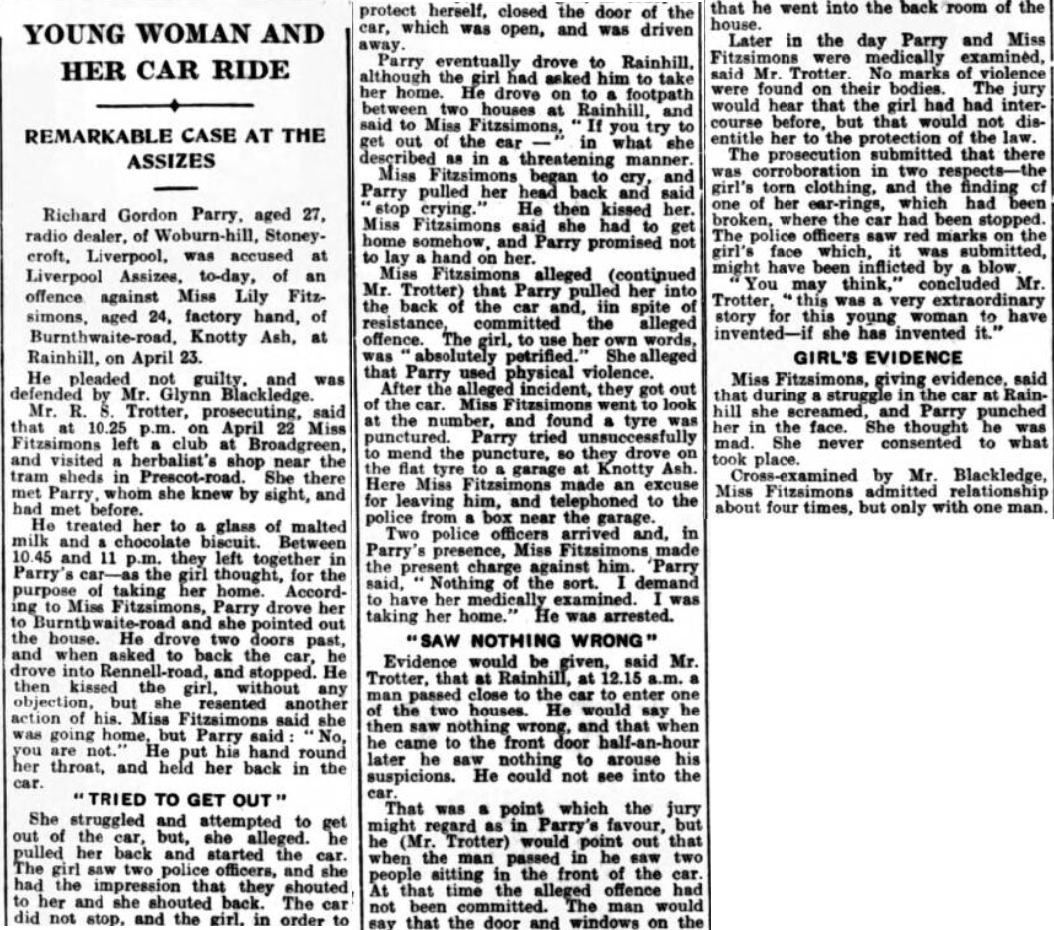
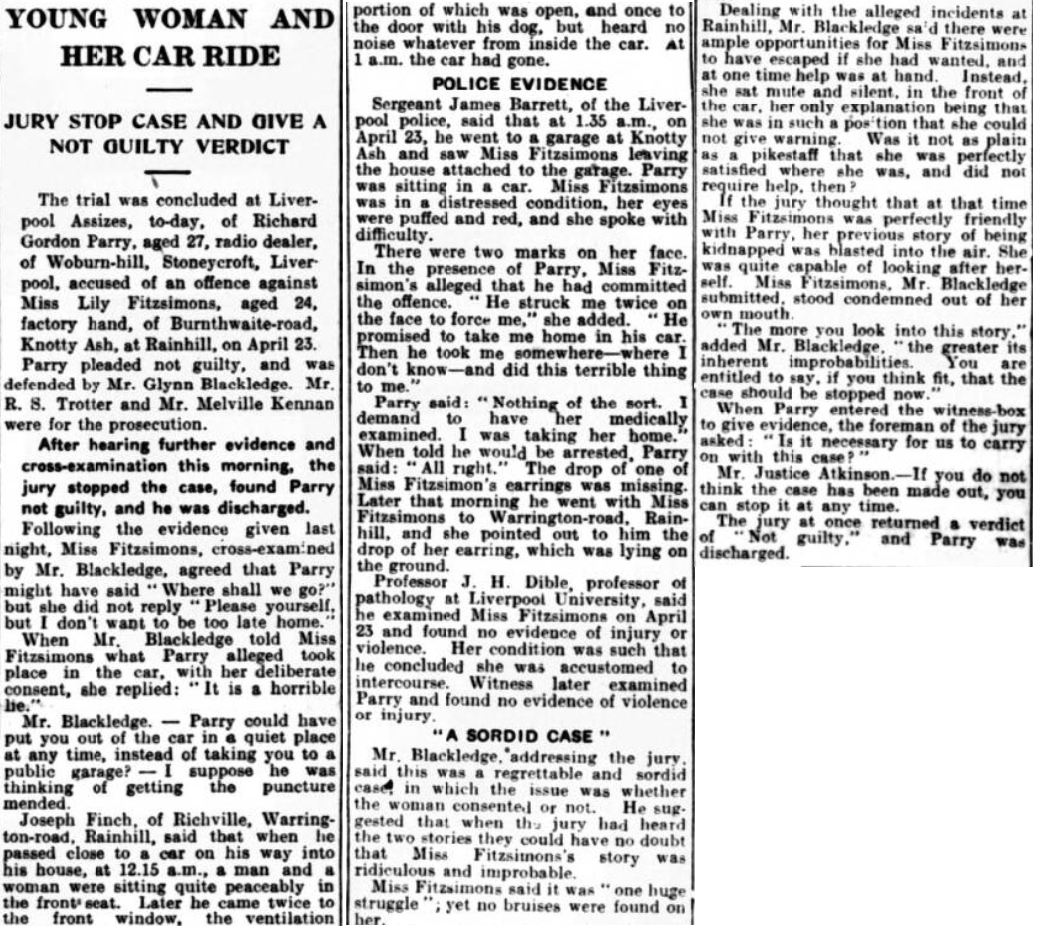
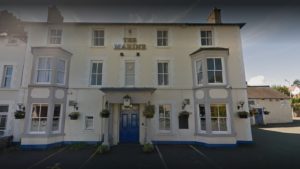
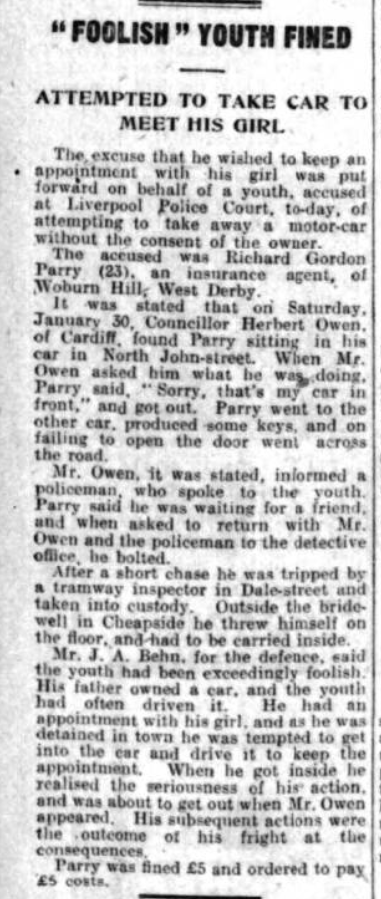
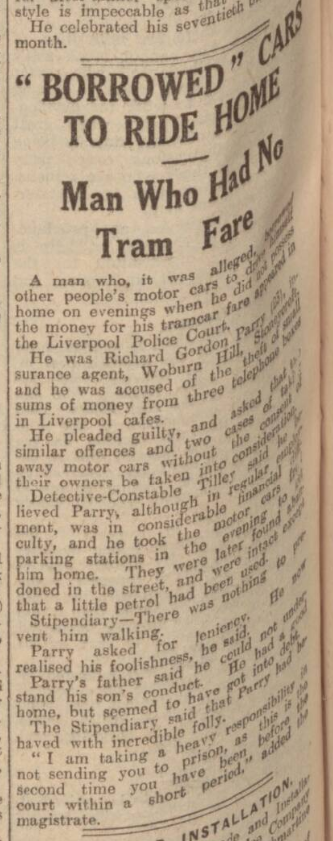
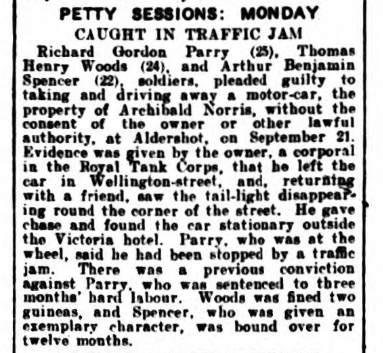
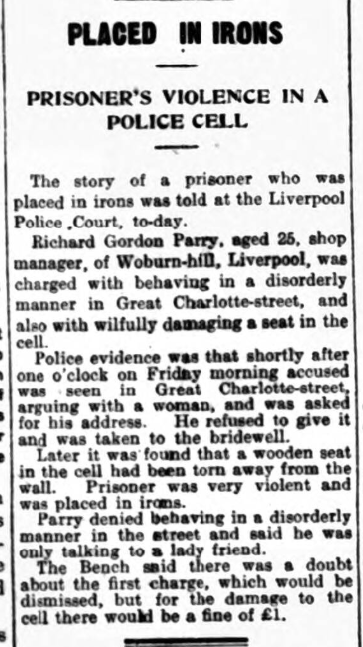
I took an interesting drive into North Wales on Saturday to walk in the footsteps of Richard Gordon Parry. Undoubtedly a fascinating character whether he is the womanising, wide boy, petty thief we are led to believe or just an innocent by stander who liked to include himself more into the Wallace mystery than he warranted.
Starting out by visiting Old Colwyn Hospital where he worked as a telephone operator and then found the nearby ‘Marine’ public house he frequented.
Next stop was the Old Stag in the quaint village of Llangernyw where I couldn’t resist the chance to stand and sit at the bar having an orange juice where Parry would have.
The last part was always going to be the hardest, to find Tyn Y Ffynnon cottage on Waterloo Hill but I managed it eventually. Reached via a steep winding single track lane with a dirt track off leading to the 18th century cottage set well back off the road.
The current owners have done lots of work on the land and to the cottage but the footprint of it and general look and feel looked to be still the same as on old photographs of it. Speaking to the owners who knew of the case and who think Parry is the killer, they told me a few local stories about Parry and we couldn’t help wonder if the confrontation on the doorstep of his London flat in 1966 led him to seek out a place in the middle of nowhere, now knowing there where still investigative journalists seeking out the truth.
For photographs and a running commentary on my visit, please visit The Murder of Julia Wallace facebook site.
Not sure what kind of haze you guys were in (I saw complaints my “Guinness haze” comments were unacceptable but you all definitely when posting often seem under the influence of something because most of the stuff is almost unintelligible.
Also someone please explain:
1. Why Antony M Brown disappears everytime someone asks for evidence of a claim he has made that is crucial to the case (locksmith, benzidine etc.)
2. Where Mark R has disappeared to? Please tell me he is safe, I am worried…
3. How Rod Stringer’s theory is meaningfully different enough from R F Hussey’s to be considered its own theory?
I would also like to note that John Parkes’ story sounds suspiciously similar to Hussey’s theory with respect to the “other fellow” Parkes claims by the garage to threaten him. Seems to me he was coached by Green, Wilkes, and Goodman. All these guys came up with this theory in the 70s (keep in mind Goodman refers to Hussey as a “good American friend of mine” and were waiting for Parry to die to find a senile moron like Parkes to coach. (Parry dies April 1980, Radio City Wallace comes out January 1981.)
This case has been disgraced by people trying to “win” with their “correct abduced” solution, people with personal investment in the events, or unscrupulous authors trying to make a pound or two. What a shame.
“Not sure what kind of haze you guys were in (I saw complaints my “Guinness haze” comments were unacceptable”
LOL!
By the way posting here for reference, Antony’s book says it’s Roberts the city analyst who conducted the benzidine test. I checked all of these:
https://www.williamherbertwallace.com/case-files/city-analyst-william-henry-roberts-all-reports-and-evidence/
In going over these again, the fact Wallace did in fact have blood on his clothes was interesting. Of course I’d seen it before but still. I wish someone had asked him how he knows the blood stain on William’s clothes was unrelated to the crime, and how certain he is of that.
Hi Josh. I expect you’d have a better chance of answers to those 3 questions if you posted them on the Julia Wallace facebook site as all 3 are members on there as you know and do not frequent this site. I can only say that I don’t see any unintelligible posts on that site as the posts are usually done the following day/s to the meet up anyway, not that anyone is ever drunk at the meet ups because as has been explained to you before A) Two of the guys don’t even drink and B) Due to driving, the other guys only have a shandy or two anyway. It is more of a social gathering and of course pubs are not uncommon places to meet before going onto visit some of the locations.
Hi again Josh. To move onto your Parkes rant. You say our meet up posts are almost unintelligible. What does this gobbledegook mean please? ‘Parkes claims by the garage to threaten him’ 🙂
How was Goodman waiting for Parry to die when he and RWE tracked him down and interviewed him on the doorstep of his flat in London in 1966?
How did any of those three journalists find Parkes whom you describe as a senile moron. Well they didn’t, they never even knew of his existence until they received a call from somebody who knew Parkes and suggested they should talk to him. Incidentally what makes Parkes a senile moron? He sounds totally with it during the Radio City interview. Where does Hussey ever come up with anything Parkes mentions?
As for the timings. Well the Radio City programme was only ever going to be on the 50th Anniversary of the murder so it was just coincidental that P died the previous April. I expect the programme would still have gone ahead anyway if P was still alive, naming him only as Mr. X as per Goodman’s book but the sensationalism of the timing now meant that Radio City could now name him as he was dead and that Wilkes could name him in his follow up book.
Whoever I speak to about this case, and being careful only to present the facts. They all, without exception say ‘What is the mystery’ It was P or P with an accomplice. The only varying issues were the finer details of how it unfolded and who the accomplice was.
They are saying that because of the way you are presenting the case. The case has too many fine details to tell someone all of it, so when you recount it, you will invariably tend to highlight information which you personally find critical.
I know first hand, as I tend to cycle through different ideas, and “as if by magic” during the periods where I thought X solution, when I told people the story of the case (even being careful not to editorialize) they seemed to come to X solution also.
It’s really an integral problem with this entire case. The tit for tat points are worthless noise, for several reasons. One reason being that various points can equally cut two ways. And you can be sucked into a sort of schizophrenic pattern of thinking where you start connecting dots between very small points and coming to conclusions based on tenuous connections.
Physical evidence is solid. Reconstructions of the crime scene itself are one example of something worth doing. I am tempted to completely delete my entire “solution” page EXCEPT for the reconstruction I did, which is the only part of the page I am really happy with.
Sorry Ged,
it was a typo it should have read “comes by the garage”. Please forgive me.
By waiting for Parry to die, I meant they couldn’t name him (or basically therefore tell this whole tabloid sequence tale) until he was dead.
RWE has btw posited Wallace as the likely killer and praised Murphy as more o less solving the case in a 2006 book he wrote with his wife Molly. So he is basically willing to say whatever. I suspect RWE is the reason that in one of the 2 famous obituaries on him linked below, which were likely written by his good friends including RWE it says this:
https://www.theguardian.com/books/2008/mar/26/culture.obituaries
Although subsequent research has shown that Wallace probably was the killer,
I bet Goodman wouldn’t be too happy about that LOL.
Not that this proves anything as people are free to change their minds, and Calum is right about the tit for tat argument style this case appears to bring out.
I thought it was interesting though…
BTW there is no way Parkes wasn’t compensated for his interview, lol let’s get real. And he definitely sounds on pills/drunk.
RMQ and Josh. You are both totally correct that there are as many pro as cons in the pointing at who did it and i’ve even just said so on the My Solution page before I read this page how but only one is completely correct but we’ll probably never know it for sure.
As for how I presented the case to those who wanted to listen, pretty much as is on my site, just the facts. In fact quite a few have praised how my lay out of the story has no agenda, just the facts. If i’m saying P lied about his Monday night alibi it’s not because I want him guilty, it’s because he lied. It is then up to others to conclude as to why that might be, could be just a hidden affair, who knows.
If I were you I wouldn’t delete anything unless you’ve since decided that it couldn’t possible have happened that way and have made a mistake. I think Antony Brown poses a number of different scenarios and that’s all you are doing. Your site as i’ve said is brilliant.
Well I could leave the solution as it is if people enjoy it, I’m just not happy with it even if it was all accurate. I’m only really happy with the reconstruction I did. The rest often revolves too much around trying to analyze what was going on in someone’s head “why would someone X when they could just Y?!” and such… Conversely the crime scene reconstruction is just a step by step recreation based on purely physical evidence in the crime scene photos.
There are various points of evidence in the case. I’m tempted to disregard everything else but that in weighing up the case and what likely happened, and just have it all based on nothing but the evidence as it stands, with little speculation on people’s way of thinking. There are some psychoanalysis type things which are true crime staples though, like people trying to establish alibis shortly after committing a murder. I remember Detective Mark Fuhrman got into an argument with a news anchor because the anchor was saying how there’s no way anyone would be going about their business so blasè if they just killed someone… Mark raged and said he says that because he has no experience with actual murderers, and that many times you will find them at a local restaurant eating fried chicken mere minutes after shooting someone dead… A couple of hours after raping and slaughtering Meredith Kercher, Rudy Guede was partying it up at a disco. Is it possible Gordon straight up murders someone or aids in a murder then just casually goes about buying cigarettes and various other activities?
Or how about arranging a murder and being so carefree about it all that he tries to con back a few pennies? Mark Fuhrman and a number of real cases suggest it is not unlikely in the real world… In THIS case Parry had an alibi covering him in the window of time, but it’s just an example of how in real criminal cases things don’t happen the way non-killers like us would think. It seems we just can’t comprehend the mindset of a sociopath.
Parry / R.J. Qualtrough etc etc etc….
Parry’s father was a trustee in his local church which was Hilberry Ave Primitive Methodist in Tuebrook…..as was the father of Ada Cook, who was also a close friend of Parry Senior – then we have the pleading to get Parry out of the country by ship or any other means.
R.J. Qualtrough who was also a Pru customer and a client of Joseph Celeb Marsden was also a member of another local Methodist church in this largely Welsh denomination. As these churches relied on preaching in each others churches, it is not a large stretch of the imagination to think that the Parry’s and Cook’s may have known Qualtrough too.
Great to have this comprehensive coverage of the JG/RW-E interview with Parry. Some points:
The 21st birthday of Lily Lloyd was in September 1931.
Re Ada Cook: it would surely give rise to suspicion if, following his questioning by the police, Parry abandoned his job and suddenly left Liverpool by ship headed for parts unknown.
At no point does Parry mention his alibi with Mrs Brine et al. He didn’t mention it on the murder night to Lily or her mother when he’s supposedly just spent 3 hours at the Brine house. For some reason which might not necessarily be suspicious re the case, he doesn’t want Mrs Brine tracked down and questioned.
“Sexually odd” can have many meanings including celibacy. There’s no evidence to support bondage or flagellation etc.
Agreed Mike.
But….Parry then does go missing from Liverpool anyway… He joins the army (there was no conscription in 1931) He does not seem the type to want voluntary discipline to me and in fact he is thrown out due to yet another misdemeanor, this time stealing an officers car. Again, is this the work of Parry senior getting his son out of the way, to Aldershot.
Why was Parry’s ‘car turned over’ ‘Stripped down’ if he is not a suspect? Was this Moore’s doing after Parke’s revelation?
What about Parry’s former next door neighbour, Les Hill He told Roger Wilkes in 1981 that he knew Parry had been interviewed for three hours at Atkinson’s Garage, and that his father knew a senior policeman who was absolutely convinced Parry was the murderer.
You are correct that Parry didn’t mention the Brines to Lily in 1931 and neither did he mention them to JG/RWE in 1966 when he could just have settled the matter once and for all. You are correct I think that he doesn’t want these people who would still be alive to be questioned. Also where is Savona’s statement or that of Miss Plant. Savona is used as an alibi by Parry but Plant is not. Plant is mentioned by Brine only.
”What about Parry’s former next door neighbour, Les Hill He told Roger Wilkes in 1981 that he knew Parry had been interviewed for three hours at Atkinson’s Garage, and that his father knew a senior policeman who was absolutely convinced Parry was the murderer.”
From above. This is on P.265 of Wilkes book. However, I assume Les Hill meant or said Parkes – not Parry?
Parkes told Les Hill that Gordon was interviewed for 3 hours at his garage? Lol.
Possibly RMQ but more conjecture. There seems to have been at least 2 policemen who have said ‘When I retire I will tell all I know’ etc… then didn’t. Lily Lloyd and RGP seem to have gone to the grave knowing more than they ever told too. If it’s a cut and dried case, why all this mysterious not telling.
It’s similar behaviour to Mark R etc claiming they saw secrets in the case files but then when the book comes out there are no secrets. It provides unearned authority, if you just claim secrets it’s like you want the person to think you must be right because you’re privy to information they don’t have.
Hi Ged,
You have mentioned Wallace having lots of time after his arrival home at ~ 6.05 pm so why did he wait until much later to do the deed.? My take on it is as follows:
Wallace didn’t know that Alan Close was running late with his milk deliveries. Had Alan been on time it even likely that the milk would have already been delivered by the time Wallace arrived home. For this reason I don’t think Alan Close ’s delivery played any part of Wallace’s original plan.
But when Wallace was (probably) informed by Julia that the milk had not yet arrived he decided to wait until Julia had established that she was alive by conversing with Alan during his delivery. Once this was done her fate was sealed and he left the house asap afterwards. Alan’s lateness provided Wallace with the unexpected and un-planned bonus of creating a narrow time window to commit the crime and get to the trams.
His non-recognition on the first tram is a puzzle. It could be that he thought he had done enough with that first conductor (re enquiries etc) to be remembered but we can never predict how individuals will react to a given situation. Someone pre-occupied with serious domestic worries in their private life might easily forget details on a routine run that they did many times each day.
Thanks Mike. So what you’re saying is that if Alan Close would have been on time, William was expecting to have at least a good half an hour to commit the crime and expect to get away with it? So why wouldn’t the police/prosecution just say there you go, game over, he had all this time to do this and clean up, dress, stage a robbery etc. What you are saying is that it was not a plan but a convenient accident that Alan Close being late provided him with too short a time to have committed the crime and without that he has no alibi whether he’s out from 18.45 on his way to Menlove or not.
His non recognition on the first tram is just another flaw in this ‘plan’. At that point he hasn’t done enough with the first conductor as he hasn’t reached Lodge Lane yet to make himself known to that conductor, what if there is no conductor, he can’t know that yet at this point. He only has to make himself recognised on the first and last tram, no need for anything in between as it means nothing. Same with Menlove, Katie Mather at the beginning and the Post Office at the end can be his time stamps and they can’t say they don’t remember him calling, the police officer, just like the Johnston’s coming out are convenient for Wallace, he seems to be having a lot of luck, along with Close being late too 🙂
A good point that someone pre-occupied with serious domestic worries might fudge and forget things, how about someone who has just battered his wife to death and now has to dispose of a weapon, make sure not 1 speck of blood is on him for when the inevitable inspection is made and walk and act quite calmly to his tram and speak to all these countless people that he should be keeping to a minimum.
Mike, I think you’ve helped my case rather than hinder it. Thank you for your time on the witness stand. 🙂
Just as an aside but possibly a very important one. His alibi at the Brines might be kosher if an accomplice is involved. Him leaving at 8.30 fits in with picking someone up after the murder after all.
However, we know the police didn’t twig his Monday night phone call alibi was a pack of lies even though they followed up where he said he was – and it didn’t match. They also followed up where he said he was Tuesday night. Parry says Savona was there, but no statement from her. Brine says a Miss Plant ‘called’ and Harold Denison ‘called’ Harold’s calling seems to last hours, how long was Miss Plant’s call, there is no statement from her either? Was his statement here taken at face value too?
Hi Ged,
Re Wallace on the first tram.
Wallace described himself as stoic. Maybe this was a discipline which he picked up in China – avoiding any external expression of emotion no matter what the circumstances. Prof McFall found his behaviour at the crime scene unnatural: calmly smoking a cigarette and flicking the ash into an ashtray as he watched him examine Julia’s body. Likewise on the trams and at Menlove he was able to distance himself from the crime and appear normal and unruffled.
As regards speaking to countless people which he should be keeping to a minimum. Here I disagree: he spoke to many people deliberately, prolonging his stay in Menlove far longer than necessary after being told 25 MGE didn’t exist. Gathering witnesses.
Wallace having from 6.05 pm onwards to commit the murder does as you say put him centre stage as a suspect. I think he tried to give the impression of a later time of death by leaving the gas fire on a low light to delay cooling of the body and indeed the first estimate was ~ 8. pm. Alan Close being late, Wallace decided to kill Julia as soon as Alan had departed and then leave asap even if it had been as early as 6.20 pm. He left early “to give enough time to search for 25 MGE.”
Whether Close being late gave him too short a time to do it and be on the second tam at 7,06 pm is still open to debate.
One of many worrying aspects to Parry’s Brine alibi in addition to the ones you mention is that this alibi only came to light with the release of the police file in the 1990s when presumably everyone involved was conveniently dead. Parry, Parry’s family, Mrs Brine and the others present could have, in the interim, come forward to clear Parry of the murder once and for all by confirming this apparently solid alibi but they didn’t. To repeat : nobody mentioned Mrs Brine until her statement was found in the 1990s.
Thanks Mike. We also have Mrs Johnston saying he wept when alone with her but seemed to try to pull himself together when in the presence of the police. Surely, wouldn’t it have been better for a guilty Wallace if it were the other way around, if indeed he is working the situation.
I thought I would add on here, regarding my visit to Llangernyw. I was speaking with someone there who showed me the path Parry used to take back to his home from the local pub. She said, Parry told one of the village ladies ‘I can see right in your bedroom as I pass down this path on my way home’. Just the sort of seediness Parry seems to be somewhat associated with and no doubt an unnerving thing for a lady living on her own to hear. Why not keep something like that to oneself if he wants to perv and try to maybe catch a glimpse of a partially dressed woman. To me it seems like a control thing. I am watching you. He probably feels invincible having got away with what he had previously. Other thefts no doubt, a false alibi, probably an assault, maybe involvement in a murder. Even the judge in Aldershot seemed bemused that he’d been avoiding a custodial sentence in Liverpool. Not this time sonny.
You’re lying bro. I doubt you even visited even outside a 100 mile radius of Liverpool in the last decade. Prove these outlandish stories. Funny how we’ve never heard this one before despite your constant harping on Parry’s admitted bad character. You just happened to run into a random old ass lady who remembered Parry saying this? Come on bro.
On off the chance it’s true, what does it prove? We know Parry is a POS; clearly he tried to rape Lily Fitzsimmons. He clearly liked women; probably a bit too much and had low inhibitions in talking to them (ADA fish shop chatting while married.)
Julia was a 69 year old woman wearing diapers; doubt Parry would have a sexual interest in her. This may be hard to believe for the fat olds from the group or Rod who admitted to “grabbing grannies” in his youth but most men would not be attracted to this, particularly a handsome youth like Parry.
Plus she wasn’t sexually assaulted.
Wallace did it. Get over it.
Josh. I posted the photos up on the facebook site, I don’t have to prove anything and I can only swear on all my loved ones lives that this story was relayed to me but I really don’t care whether you believe it or not.
Why does his involvement in the killing of Julia Wallace have anything to do with him sexually fancying her lol.
Wallace couldn’t have done it due to a number of issues I and his defence raised which the appeal judges concurred with, the first of its time. Get over that. 😉
I don’t know what it has to do with it but Goodman etc and other losers have hinted at it. Also you “relayed” a story about Parry being a perv, so I’ll flip the question on you and ask what does that have to do with the murder of Julia Wallace?
Wallace now “couldn’t” have done it? Not even it wasn’t proved or maybe he didn’t do it or he’s likely innocent but you’re now claiming he “couldn’t” have done it? That is definitely not what the appeal judges ruling says; all it says it the case wasn’t proved adequately.
I see you ran away from the 7:30 time. That is the time Parry (in your aspie hypothetical) would see. Don’t pivot and run away from that. Run that by the pillsbury doughboy and Kentigern’s bitch since it doesn’t seem like you are giving original thoughts.
He both could do, and DID do, and then relayed the precise way in which he smashed her head in with a wrench, just like OJ Simpson. These are literally OJ Simpson truthers, and they go out and impair their judgement even further with pints of Carlsberg (or a soft drink for autist Rod) and pork scratchings while musing over who diddu.
If Wallace diddu, which he did, the meetups are DONE. They have a deeply vested interest in maintaining mystery to have an excuse to have friendship groups and social meets. It’s like a knitting club or something. Everyone at the pub must know them as like weird crew who come in and discuss ancient murders. MI5 are probably tracking them as potential threats.
Forget OJ bloody Simpson lol. This is 1931 we’re talking about. The reason everybody still talks about this case is because it is not just assumed like the police that Wallace did it. Parry frequented the cafe with his mate Jimmy Tattersall as well as all the other Thursday’s he’d have seen what time people come to play their games, he doesn’t need to see a 7.30 or not, he sees with his eyes, for all we know he could even have got into conversation with someone weeks earlier asking about joining and finding out the times were only loosely adhered to within reason (just like they seemingly were) I mean ha ha, you could even not turn up for weeks on end so why wasn’t that counted against you. I’m afraid all this OJ lark or battering with 11 strokes is a smokescreen. The facts are Wallace provided no alibi for himself, the call therefore seems legit, Wallace didn’t even bring Close into it to try to get himself off. Wake up, smell the coffee and see it for what it is. An upstanding, honest, trustworthy pillar of his local community, known by many vs the lying, thieving, perv of a snake. There is only one winner.
So wife murderer James Krauseneck didn’t do it because he’s a “pillar of his local community” and it must be the rapist dude who said he did it and gave a completely wrong description of the crime and the victim (in exchange for prison benefits) because the rapist dude is evil and James is upstanding. Or the pedophile across the street from Jonbenet Ramsey because Patsy, whose handwriting looks identical to the fake ransom note, was an “upstanding pillar” of the community so it can’t be her. James killed his wife with ONE stroke of an axe by the way, embedded straight deep in her skull, after arguing and sleeping on the couch that night (reminiscent of Sam Sheppard sleeping on the couch???). OJ was an upstanding pillar of his community much moreso than trashcan embittered Wallace.
This is dumb pendejo logic. Like just saying oh he must have watched what time people arrived, and asked around, “for all we know” and whatever. This is bullshit and only pendejos would think this way. Wallace didn’t “give an alibi for himself”, a solid one anyway, because obviously he can’t have one when he actually did it. Parry was at the Brine’s when Julia got slain. If they’re lying for him he could have been “with them” on Monday too. It is legitimate and he was exonerated and cleared of suspicion for reasons beyond that. Largely because the husband clearly did it, which is always the case.
Wallace did it. Told you how he did it. What weapon he did it with. Case was solved almost 100 years ago. It is retarded. Every fact that “ruled out” William is a fabrication, like idiotic drain tests that never happened and would be ineffective even if they did happen (but they didn’t), and you’re only pretending he’s innocent as an excuse to go on pub crawls with aspies and dwarves.
Nobody discusses this case anymore except us, it is literally just for autistic freaks. Normal people look puzzled when you discuss the case, they are weirded out, they want to get away from the person discussing it ASAP.
Ged, you have the the IQ of the average homo habilis.
PS. Tell Antony I want my royalty check; he used tons of myself in his books but we know he ate it already.
Hi Josh and Calum. You know I love your put downs, but only because they are so childish. I cannot comment on lost royalties, you will have to speak to the author about that but he does credit you.
The dumb logic is comparing Wallace to Krauseneck and O.J. Simpson 🙂 and also saying things like ‘it’s always the husband’. Did Nicola Bulley’s husband do it too, he was accused at one point, How about the kidnap of Shannon Mathews – both big cases here. I could name countless more just off nightly Sky Crime documentaries.
If he had no alibi and didn’t even offer Alan Close as his get out of the noose card then why were the police so dumb as to not be able to convict him beyond all reasonable doubt? Maybe because there was absolutely nothing to convict him on and a lying, conniving Wallace would undoubtedly had plenty of time and chess mentality to have better answers to the mystery than he gave such as simply insisting the bolt was on, and knocking very loudly creating a scene, getting the tram driver on his first tram to notice him instead of one at Penny Lane that he had no need to etc etc. Think about it objectively – I know you can do it!!!
Cool story bro… Nicola Bulley wasn’t murdered at all, she fell in a river. Julia was murdered, by her husband, as usual (because it’s pretty much always the husband, hence the husband is always suspect #1 when a spouse “mysteriously” vanishes off the face of the Earth like Shannan Watts, or is found dead in their house like Sam Sheppard’s wife).
Josh was in fact not given credit by the way. Credit is for LOSERS dude lol. I don’t even put my name here. Who cares about credit? Only Rod works for “credit” because he has nothing else in his failed life. That’s why he patrols Wikipedia 24/7. What a slut aspie. I’ll legit resurrect Kentigern just to KOOL-AID man through the wall of your next pub meet to slap him up again. Even the corpse of Kentigern could body that sperger. Straight up “OOOHHH YEAAAAAHHHH” through the pub wall, Rod screaming, getting his ass BEAT to a pulp.
Go back to Facebook with the soccer moms and ancient virgins. Thanks bro. Literally ONE correct piece of input (regarding the weather conditions, which you got dead-on correct) ever. After like, decades of research wow (and your actual website says sleet so wtf lol). Great job man thanks. The Facebook group is calling you… It’s the little gnome Steven… He’s saying “come back Gerard, return to us…”
Ha ha, you do make me laugh but I come on here for debate really and in light of the fabulous police force with all it’s super brains managing to mess up the crime scene, imagine the caller had to be the killer, fail to time trial the Monday trams (or did do it but W was found not able to make it so spirited the findings away) and lots of other things including missing alibi statements of Phyllis Plant and Savona Brine then not cross checking Parry’s Monday night alibi lie etc we can only conclude that the reason they were not able to pin this on Wallace beyond all reasonable doubt was because there is reasonable doubt that he did it. End of really as you say isn’t it.
Yeah okay cool story bro. Very nice.
https://test.mensa.no/home/test/en
Result?